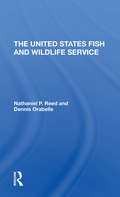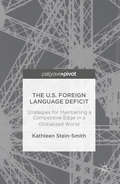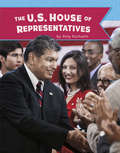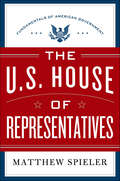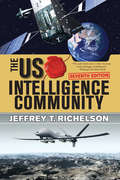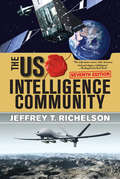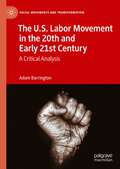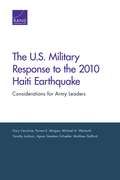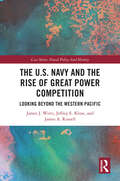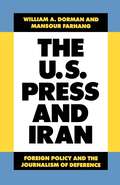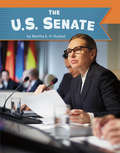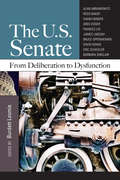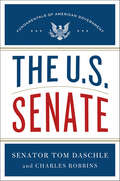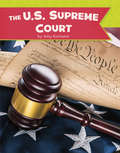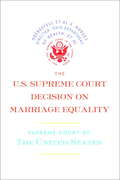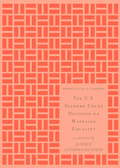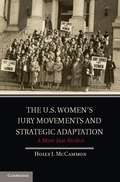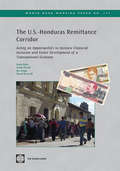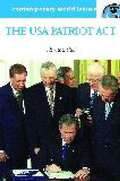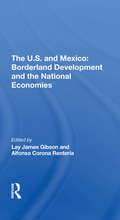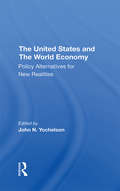- Table View
- List View
The U.S. Fish And Wildlife Service
by Nathaniel Pryor Reed Dennis DrabelleThis book provides in-depth coverage of the U.S. Fish and Wildlife Service, the federal agency that manages the national wildlife refuge system, protects endangered species, and conducts fish and wildlife research. In addition to detailing the history and organization of the service, the authors take a hard look at its current—and often controversi
The U.S. Foreign Language Deficit
by Kathleen Stein-SmithThis volume explores why Americans are among the least likely in the world to speak another language and how this U. S. foreign language deficit negatively impacts national and economic security, business and career prospects. Stein-Smith exposes how individuals are disadvantaged through their inability to effectively navigate the global workplace and multicultural communities, how their career options are limited by the foreign language deficit, and even how their ability to enjoy travel abroad and cultural pursuits is diminished. Through exploring the impact of the U. S. foreign language deficit, the author speaks to the stakeholders and partners in the campaign for foreign languages, offering guidance on what can and should be done to address it. She examines the next steps needed to develop specific career pathways that will meet the current and future needs of government, business, and industry, and empower foreign language learners through curriculum and career preparation.
The U.S. House of Representatives (U.S. Government)
by Amy KortuemHow does the U.S. House of Representatives work? Discover who can be a representative, what they do, where they work, and more. Descriptive main text, full-color photos, fast facts, and callout definitions work together to support understanding.
The U.S. House of Representatives: Fundamentals of American Government
by Matthew SpielerThe third book in the Fundamentals of American Government civics series explores the inner workings of this important part of the legislative branch. As with Selecting a President and The U.S. Senate, this book is written for all audiences, but voiced toward high school seniors and college freshmen-or any citizen interested in a concise yet authoritative exploration of this representative entity.Written by former social policy analyst and political writer Matthew Spieler, this compelling and digestible book carefully examines and explains exactly how the House of Representatives operates. From its voting procedure to historic beginnings and modern day issues, there is no area of this governmental body left un-revealed.
The U.S. Intelligence Community
by Jeffrey T. RichelsonThe role of intelligence in US government operations has changed dramatically and is now more critical than ever to domestic security and foreign policy. This authoritative and highly researched book written by Jeffrey T. Richelson provides a detailed overview of America's vast intelligence empire, from its organizations and operations to its management structure. Drawing from a multitude of sources, including hundreds of official documents, The US Intelligence Community allows students to understand the full scope of intelligence organizations and activities, and gives valuable support to policymakers and military operations. The seventh edition has been fully revised to include a new chapter on the major issues confronting the intelligence community, including secrecy and leaks, domestic spying, and congressional oversight, as well as revamped chapters on signals intelligence and cyber collection, geospatial intelligence, and open sources. The inclusion of more maps, tables and photos, as well as electronic briefing books on the book’s Web site, makes The US Intelligence Community an even more valuable and engaging resource for students.
The U.S. Intelligence Community: Organizations, Operations And Management, 1947-1989, Guide And Index (Making Of U. S. Policy Ser.)
by Jeffrey T RichelsonThe role of intelligence in US government operations has changed dramatically and is now more critical than ever to domestic security and foreign policy. This authoritative and highly researched book written by Jeffrey T. Richelson provides a detailed overview of America's vast intelligence empire, from its organizations and operations to its management structure. Drawing from a multitude of sources, including hundreds of official documents, The US Intelligence Community allows students to understand the full scope of intelligence organizations and activities, and gives valuable support to policymakers and military operations.The seventh edition has been fully revised to include a new chapter on the major issues confronting the intelligence community, including secrecy and leaks, domestic spying, and congressional oversight, as well as revamped chapters on signals intelligence and cyber collection, geospatial intelligence, and open sources. The inclusion of more maps, tables and photos, as well as electronic briefing books on the book's Web site, makes The US Intelligence Community an even more valuable and engaging resource for students.
The U.S. Labor Movement in the 20th and Early 21st Century: A Critical Analysis (Social Movements and Transformation)
by Adam BarringtonThis book provides a critical analysis of the labor movement in the United States in the 20th and early 21st century. It explores ideological trends within the labor movement and its conflicts with capital and the state. It identifies class-collaborationism between the conservative labor bureaucracy and the capitalist class as the primary source of U.S. labor’s precariousness and fragility. It argues that the U.S. labor movement at its most radical and militant stage was an effective force for change against the power structure in the early 20th century. At the opposite end, it also argues that today’s institutionalized labor movement led by the AFL-CIO hinders labor’s historic struggle against capital and aids in the maintenance of the existing capitalist order. The book concludes by assessing the prospects for the future development of militant working-class activism and identifies essential components of an emerging radical labor movement that is capable of effectively challenging the capitalist system in the period ahead.
The U.S. Military Response to the 2010 Haiti Earthquake: Considerations for Army Leaders
by Agnes Gereben Schaefer Forrest E. Morgan Gary Cecchine Michael A. Wermuth Matthew Stafford Timothy JacksonThis report examines how Joint Task Force Haiti (JTF-Haiti) supported the humanitarian assistance and disaster relief efforts in Haiti. It focuses on how JTF-Haiti was organized, how it conducted Operation Unified Response, and how the U. S. Army supported that effort. The analysis includes a review of existing authorities and organizations and explains how JTF-Haiti fit into the U. S. whole-of-government approach and the international response.
The U.S. Navy and the Rise of Great Power Competition: Looking Beyond the Western Pacific (Cass Series: Naval Policy and History)
by James J. Wirtz James A. Russell Jeffrey E. KlineThis volume describes how technological and geo-political trends are rapidly transforming maritime affairs. A mix of original and previously published material, this volume describes how the 21st-century great power competition is changing the face of naval operations in general, and U.S. Navy operations in the Western Pacific in particular. The rise of an assertive China and its new anti-access and area-denial capabilities threaten the aircraft carrier-based maritime dominance of the U.S. Navy. Military and political trends in the Western Pacific and beyond suggest that the world is encountering a pivotal moment when existing weapons, tactics, and operations might be rendered obsolete by techno-strategic change. This volume considers these developments from three perspectives by describing: (1) the techno-strategic setting; (2) the institutional constraints that impede the ability of the U.S. Navy to respond to these changes; and (3) a new approach to naval force planning and strategy to cope with these developments. The volume culminates in a discussion of sophisticated strategies and operational concepts that position the U.S. Navy and its maritime allies and partners to prevail in today’s techno-strategic churn. This book will be of much interest to students of naval policy, strategic studies, Asia-Pacific politics, and International Relations.
The U.S. Press and Iran: Foreign Policy and the Journalism of Deference
by William A. Dorman Mansour FarhangNo one seriously interested in the character of public knowledge and the quality of debate over American alliances can afford to ignore the complex link between press and policy and the ways in which mainstream journalism in the U.S. portrays a Third World ally. The case of Iran offers a particularly rich view of these dynamics and suggests that the press is far from fulfilling the watchdog role assigned it in democratic theory and popular imagination.
The U.S. Senate (U.S. Government)
by Martha E. RustadWhat is the U.S. Senate? Learn about senators, how bills become laws, where senators work, and more. Descriptive main text, full-color photos, fast facts, and callout definitions work together to support understanding.
The U.S. Senate: From Deliberation to Dysfunction
by Burdett LoomisWith an avalanche of scholarship on the House, it can be tough to balance out coverage in a typical Congress course with appropriate readings on the "slow institution." Offering top-notch research geared to an undergraduate audience, Loomis' new edited volume represents a broad picture of the contemporary Senate and how it came to be. While addressing issues of delay, obstruction, and polarization in a variety of ways, the scholars in this collection are not proposing a reform agenda, but instead, explore the historical and political contexts for how difficult it can be to change a non-majoritarian, highly individualistic institution. Students will come away from these chapters with a much greater appreciation of the Senate's unique combination of tradition, precedent, and constitutional mandate.
The U.S. Senate: Fundamentals of American Government
by Tom Daschle Charles RobbinsThe second entry in the civics series clearly and concisely explains how the United States Senate works.The U.S. Senate is the second book in the Fundamentals of American Government civics series, exploring the inner workings of this important part of the legislative branch. As with Selecting a President, this book is written for all audiences, but voiced toward high school seniors and college freshmen—or any citizen interested in a concise yet authoritative exploration of this representative entity. Written by former Senator Tom Daschle, and co-written by acclaimed journalist Charles Robbins, this compelling and digestible book carefully examines and explains exactly how the Senate operates. From its electoral process to voting procedure, historic beginnings to modern day issues—there is no area of this governmental body left un-revealed. Told with an insider's perspective there is not a more defining or easily accessible compendium detailing the U.S. Senate.
The U.S. Supreme Court (U.S. Government)
by Amy KortuemWhat does the U.S. Supreme Court do? Learn about who can be on the Supreme Court, how they are chosen, where they work, and more. Descriptive main text, full-color photos, fast facts, and callout definitions work together to support understanding.
The U.S. Supreme Court Decision on Marriage Equality
by Supreme Court of the United StatesThe complete text of the landmark Supreme Court decision on marriage equality The 2015 Supreme Court decision Obergefell et al. v. Hodges legalized gay marriage across the United States. This edition collects the widely quoted decision by Justice Kennedy, as well as the dissents of Justices Roberts, Scalia, Thomas, and Alito. Of tremendous interest to general readers and students of American history, The U.S. Supreme Court Decision on Marriage Equality is a milestone in the history of human and civil rights. It is an essential document of our times.From the Trade Paperback edition.
The U.S. Supreme Court Decision on Marriage Equality, Gift Edition
by Anthony M. KennedyA beautifully packaged gift edition of Obergefell et al. v. Hodges, Justice Anthony Kennedy's landmark Supreme Court decision on marriage equality A milestone in the history of American civil and human rights, Obergefell et al. v. Hodges legalized gay marriage across the United States. A powerful testament to the progress of human and civil rights, The U.S. Supreme Court Decision on Marriage Equality is an essential document of our times.From the Hardcover edition.
The U.S. Supreme Court: A Very Short Introduction
by Linda GreenhouseFor 30 years, Pulitzer Prize-winning journalist Linda Greenhouse chronicled the activities of the U. S. Supreme Court and its justices as a correspondent for the New York Times. In this Very Short Introduction, she draws on her deep knowledge of the court's history and of its written andunwritten rules to show readers how the Supreme Court really works. Greenhouse offers a fascinating institutional biography of a place and its people - men and women - who exercise great power but whose names and faces are unrecognized by many Americans and whose work often appears cloaked in mystery. How do cases get to the Supreme Court? How do the justices goabout deciding them? What special role does the chief justice play? What do the law clerks do? How does the court relate to the other branches of government? Greenhouse answers these questions by depicting the justices as they confront deep constitutional issues or wrestle with the meaning ofconfusing federal statutes. Throughout, the author examines many individual Supreme Court cases to illustrate points under discussion, ranging from Marbury v. Madison, the seminal case which established judicial review, to the recent District of Columbia v. Heller (2008), which struck down the District of Columbia'sgun-control statute and which was, surprisingly, the first time in its history that the Court issued an authoritative interpretation of the Second Amendment. To add perspective, Greenhouse also compares the Court to foreign courts, revealing interesting differences. For instance, no other country inthe world has chosen to bestow life tenure on its judges. A superb overview packed with telling details, this volume offers a matchless introduction to one of the pillars of American government.
The U.S. War on Drugs at Home and Abroad
by Jonathan D. RosenThis book examines the U.S. war on drugs at home and abroad. It provides a brief history of the war on drugs. In addition, it analyzes drug trafficking and organized crime in Colombia and Mexico, and the role of the United States government in counternarcotics policies. This work also examines the opioid epidemic, addiction, and alternative policies.
The U.S. Women'S Jury Movements and Strategic Adaptation
by Holly J. MccammonWhen women won the vote in the United States in 1920 they were still routinely barred from serving as jurors, but some began vigorous campaigns for a place in the jury box. This book tells the story of how women mobilized in fifteen states to change jury laws so that women could gain this additional right of citizenship. Some campaigns quickly succeeded; others took substantially longer. The book reveals that when women strategically adapted their tactics to the broader political environment, they were able to speed up the pace of jury reform, while less strategic movements took longer. A comparison of the more strategic women's jury movements with those that were less strategic shows that the former built coalitions with other women's groups, took advantage of political opportunities, had past experience in seeking legal reforms, and confronted tensions and even conflict within their ranks in ways that bolstered their action.
The U.S. of EH?: How Canada Secretly Controls the United States and Why That's OK
by Kerry Colburn Rob Sorensen“Uncovers evidence of covert Canadian usurpation . . .Thankfully, Colburn has some tips on identifying these stealthy yet tidy marauders in our midst.” —Seattle WeeklyCanadians are peaceable, friendly, unassuming, and adorable. They’re also secretly in control of nearly every aspect of life in the Southernmost Canadian territory known as the United States. This hilarious illustrated compendium of real facts and wild assertions traces a vast, maple-leaf conspiracy that plays up Canada’s self-effacing second fiddle image to the U.S. while it creates and clandestinely controls nearly everything Americans hold dear, from Superman to basketball to William Shatner to macaroni and cheese. With everyday life in the U.S. already as much as 70% Canadian, and our music, movies, and TV shows filled with subliminal pro-Canadian messages, the authors of So, You Want to Be Canadian reveal that in actuality, you already are.“The premise is that Canadians have gotten their overly polite (and no doubt well groomed) mitts on everything. The U.S. of Eh? includes lists of many Canadian things—hotties, music, actors, inventions—as well as lots of general silliness about the ‘maple leaf conspiracy.’” —January Magazine
The U.S.-Honduras Remittance Corridor: Acting on Opportunity to Increase Financial Inclusion and Foster Development of a Transitional Economy
by Kamil Borowik Isaku Endo Sarah Hirsch Jan RoggeThis paper provides an overview of remittances and migration between Honduras and the United States and analyzes the remittance regulatory and market environment, including financial inclusion strategies, transnational economic activities, and the impact of remittances on the Honduran economy. 'The U.S.-Honduras Remittance Corridor' makes policy recommendations to the authorities of Honduras and the United States, especially for regulatory reforms that promote the integrity and efficiency of money transfer businesses. We also recommend the development of financial infrastructures in rural areas for better distribution of remittances. Furthermore, we suggest that public policy should be more focused on building an environment for investment in the community and developing local businesses that export to Honduran communities abroad.
The U.S.-Japan Security Alliance
by G. John Ikenberry Takashi Inoguchi Yoichiro SatoIn this book, American and Japanese experts examine to what extent diverging priorities in the U. S. -Japan alliance are real and whether they are not remedied with political and diplomatic leadership and other processes. American and Japanese authors are paired to analyze the same topic, where doing so is possible, for comparing their perspectives.
The U.S.A. Patriot Act of 2001: A Reference Handbook
by Howard BallThis handbook provides brief biographies of the major players responsible for U.S. national security, and reprints portions of the USA Patriot Act, a 2001 report on foreign terrorist organizations, the Domestic Security Enhancements Act, and government memos. In the opening chapters, Ball, who has taught political science at several universities, examines the actions taken by the Bush administration to assess the unique threat posed by Islamic fundamentalists, identifies critics of the Patriot Act, and summarizes the response of the Bush administration to such criticism.
The U.s. And Mexico: Borderland Development And The National Economies
by Lay J Gibson Alfonso Corona RenteriaAddressing the economic aspects of ties between the United States and Mexico, this book looks at the structural characteristics of the border region and the flow of goods, services, capital, and people between the two countries. The contributors describe the cultural, economic, and demographic dimensions of the borderlands and focus on specific issues critical to the region, among them environmental pollution, migration, territorial issues, and the implications of borderzone industrial growth. Finally, the authors consider how these issues affect the national economies and relations between the two countries.
The U.s. And The World Economy: Policy Alternatives For New Realities
by John YochelsonThe structure of the world economy has changed dramatically in recent years, reflecting a redefinition of U.S. interests in light of increasing foreign penetration in U.S. markets, global pressures for protectionist policies, the emergence of the newly industrializing countries, and the vulnerabilities of the international financial system. This collection of essays addresses these and other developments facing policymakers in business, government, and labor. The authors discuss policy challenges in international trade, technological competition, exchange-rate disequilibrium, Third World debt, and the role of the private sector.
